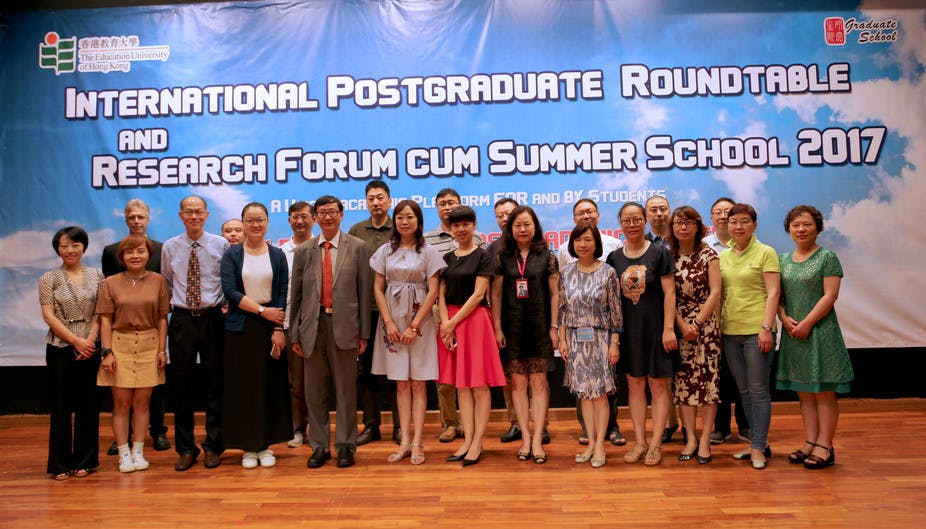Since 2010, the graduate school of the Education University of Hong Kong (EduHK, ranked second in Asia) has organised a summer school program. In 2017, four researchers from the University of Lorraine were invited to participate in this international event.
The story begins with Dominique Macaire’s meeting Laura Déléant, Lisa Jeanson and Jérémy Filet as members of the organising committee of the Early Career Researchers International Conference. Professor Macaire, who started the exchanges between the two universities, offered the PhD candidates the opportunity to co-construct a workshop for masters- and doctoral-level students.
Step 1: Welcoming the Hong Kong delegation: The team spent two days working with twelve PhD candidates from EduHK and it was a culture shock. The presentation conventions of Hong Kong were far removed from those of France, but the delegation was won over by the team and its practices.
Step 2: “Made in France”: A few months later, the four Lorraine researchers flew around the world and took their work to a new level. Their task was to integrate their French-style workshop into the International Postgraduate Roundtable and Research Forum cum Summer School 2017, on the theme of “Whole-person development: Student as academic leader”.
Dominique Macaire first introduced the general principles for the oral presentation. Her lecture compared different academic cultures in the world. PhD candidates with different disciplinary and cultural backgrounds then participated in the workshop created by Lisa Jeanson and Laura Déléant, PhD candidates in ergonomics, and Jérémy Filet, a PhD candidate in 18th Century British history.
Presenting research at an international level
An oral presentation is not just about organising a scientific presentation, something not even the audience always realises. Developing a personal brand can make presentations more convincing, especially at an international level, where codes can be different.
First, researchers need to focus on oral presentation skills. Voice, gesture and posture are important – a talk is not just about content. Second, creating an original visual medium also contributes to success. This is where design, information and ergonomics come in: an effective medium does not distract the audience, it helps them and the presenter. Moreover, the uniqueness of this workshop stems from the fact that those in the audience can apply it directly.
The “3 Minute Thesis” activity was used as an example of how to improve one’s presentation skills. Participants were invited to present their work to the audience. Jiyun Bae (Japan) and Michael Dannhauer (Germany) joined in and presented their research topic in this way. The session went on with some brainstorming to stimulate exchanges between participants. Everyone received personalised feedback, which was helpful to all the PhD candidates.
Nothing was determined in advance, and these interactions made up the workshop’s content. The tutors also learned from the students’ feedback and were able to improve their own methods. Hence, the proposal of the French delegation fit perfectly with the theme of EduHK’s Summer School.
The EduHK Summer School
From July 3 to 7, 2017, the event welcomed 12 000 participants. Among them were 300 experienced researchers and 600 speakers from 14 different countries and three continents (Asia, Europe and North America). Six guest speakers from different cultural and disciplinary backgrounds tackled the issues of leadership, personal development and research competencies.
600 talks of 10 minutes each were given in five parallel sessions. This panel was moderated by the organising committee, entirely composed of PhD candidates from universities all over the world.
The EduHK Summer School also hosted a roundtable discussion on the theme “Whole-person development: Building students as academic leaders”, with two members from each delegation. After the discussion, Professor Lo, head of the graduate school, suggested creating an international group of early-career researchers of all disciplines.
Integrating PhD candidates within a complex system
The scientific world is no longer aligned with binary logic – local or global. PhD candidates can no longer write a thesis from their offices. Instead, they need to develop other abilities and carefully manage their time.
The commercialization of research is much more than an oral or written presentation. Participating in events like this one is useful for individual PhD candidates as well as for various scientific communities.
In addition, researchers should improve their cooperation skills within interdisciplinary and intercultural teams. Events such as this help early-career researchers to extend their academic network and prepare the basis for future collaborations. Therefore, PhD candidates can adapt to this complex system by sharing their experiences and knowledge within the international academic community.
By placing PhD candidates at the centre of international events, graduate schools can give them opportunities to acquire organisation skills, and assume new responsibilities. Henceforth borderless, these new and complex cooperative systems provide excellent opportunities for the most audacious to get involved elsewhere…


